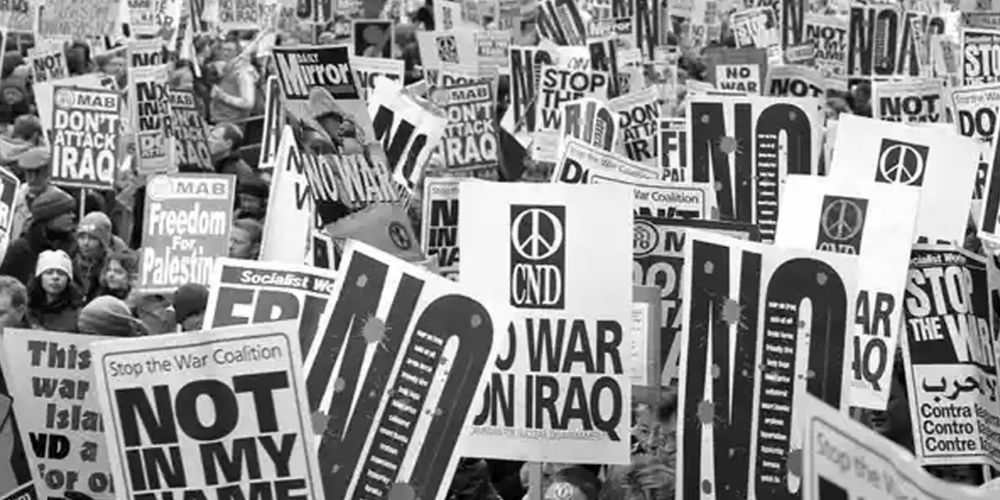I was 16 years old, sitting in an A-level politics class in a college in the middle of London when suddenly my teacher asked the class, “Why did we go to war with Iraq?” Her question filled me with fury and I abruptly answered, “It isn’t a war, it’s an invasion”.
Even at 16, too young to even vote, the intentions behind the UK and US invasion of Iraq were clear to me, as they were to the over 1.5 million British protesters that took to the streets of London on February 15th 2003. From trade unions to anti-war groups, religious communities of all faiths, students, hundreds of coaches filled with protestors driving down from cities like Glasgow and Manchester, people came to march on Westminster.
It is estimated that over 36 million people across the globe mobilised and protested against the invasion of Iraq in over 600 cities. From London, to Tokyo, to Havana, to Moscow, to Nairobi, to Antarctica, the world was united in the biggest ever co-ordinated demonstration in the history of humanity.
This protest will always be remembered not only for how many people participated, but also for how those in power deployed every strategy possible to quash the opposition. Governments, the press, secret services, and arms and oil companies were all colluding in pursuit of their vested interests in furthering the interests of imperialism in the Middle East.
In one of the most outrageous acts of perjury whilst in political office, Blair brazenly misled the British Parliament by presenting his “dodgy dossier”, claiming that Iraq possessed weapons of mass destruction and that these could be detonated within 45 minutes — all later shown to be baseless claims.
Blair also worked closely with MI5 and the CIA, ordering agents to “dig up dirt” on UN Security Council voting members, in order to blackmail them into voting in favour of invading Iraq at the controversial UN vote in 2002. Katherine Gun, an MI5 whistleblower, came forward with this information in 2003 and was subsequently arrested and faced trial under the “Official Secrets Act”.
Tony Blair reportedly had countless secret meetings and telephone calls with media mogul Rupert Murdoch, where the pair conspired to to sway public opinion via newspapers and TV screens. The BBC even banned its own news presenters from not just reporting on, but even personally attending the protest, aligning itself and its entire staff in favour of the invasion.
Today, 20 years later, not a single person has faced justice over the illegal invasion of Iraq, the murder of over a million innocent Iraqis, over 2.5 million Iraqi children made orphans, over 4 million Iraqis internally displaced, forcing 3 million Iraqi refugees into exile, and the millions more dealing with the trauma of decades of brutal occupation, which included torture camps like Abu Ghraib.
Iraq has been left in ruins, political instability is constantly fuelling sectarian violence, and the US’s use of chemical weaponry has left cities like Fallujah with higher levels of radiation than Hiroshima. Over 11 million Iraqis live below the poverty line, in a country which for centuries was the economic and cultural epicentre of the region.
Two decades on, we need to reflect on why the biggest protest in the history of humanity did not succeed. We need to ask ourselves if the modern nature of “one-off” and “day out” protests needs to change. Despite a huge turnout on a single occasion, perhaps it is consistency and militancy of organisation and in action that is the key?






